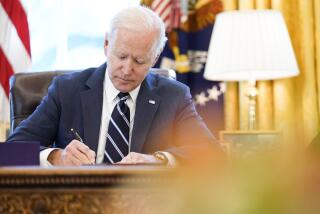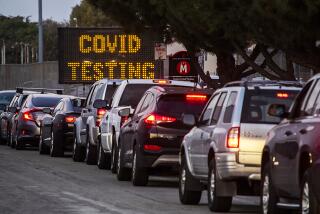Oversight of $2-trillion coronavirus relief act hasn’t gotten off the ground
- Share via
WASHINGTON — Oversight systems are still largely dormant for the $2 trillion in coronavirus economic relief passed by Congress last month, leaving gaping holes in accountability just as the Treasury Department prepares to give hundreds of billions of dollars in aid to corporations.
The coronavirus response package was the largest in U.S. history, and lawmakers wanted to ensure adequate checks and supervision of the massive funding. But with no less than four oversight bodies now struggling to get up and running, and Congress functioning remotely because of the pandemic, lawmakers acknowledge the deficiency.
“Oversight is occurring; it’s just not occurring as effectively as it would be if we could have committee hearings with administration testimony,” said House Majority Leader Steny H. Hoyer (D-Md.). “The ideal, of course, is to get back into session, have hearings [and] call witnesses.”
Rep. Katie Porter (D-Irvine), who has emerged as one of Congress’ fiercest questioners, says oversight needs to start immediately because an early foot in the door means watchdogs can shape the way the Coronavirus Aid, Relief and Economic Security Act is implemented.
The biggest area of concern for Porter and other Democrats is the nearly $500-billion fund that the Treasury Department — with significant control by Secretary Steven T. Mnuchin — will use to buoy corporations.
“Because that $500 billion has not yet been scooped out by Treasury and delivered to industry, we have the ability to do oversight in real time,” Porter said in an interview. In addition, watchdogs can “engage in a meaningful, productive way with the Treasury secretary about what the terms and conditions of this assistance should be, making sure it will help the economy by keeping workers on payroll and with health benefits.”
The law put into place three oversight bodies, and House Speaker Nancy Pelosi (D-San Francisco) has proposed a fourth:
- The law’s five-person Congressional Oversight Commission — which will oversee the corporate fund — had only one member until Friday, when three additional members were named. With the Capitol and congressional office buildings largely shut down, the first appointee, Bharat Ramamurti, a former staffer for Sen. Elizabeth Warren (D-Mass.), has so far tried to do the body’s work from his Twitter account and through public comments and op-eds.
- The post of special inspector general for pandemic recovery — created under the legislation — is vacant. President Trump’s nomination of White House lawyer Brian Miller to the job has raised questions about Miller’s independence, putting his Senate confirmation in doubt.
- Another group of inspectors general tasked by the law to oversee the entire act, the Pandemic Response Accountability Committee, lost its first leader — Defense Department acting Inspector General Glenn Fine — when Trump fired him this month.
- And, finally, the committee Pelosi wants to set up can’t get to work until Congress approves the group’s existence through a vote. House Minority Leader Kevin McCarthy (R-Bakersfield) said the panel was redundant, suggesting Republicans may block any move to approve it by unanimous consent. That would mean Pelosi would have to wait until Congress is back in session.
Complicating matters is Trump, who said as he signed the CARES Act into law that he would not abide by some of the oversight rules. In a signing statement, the White House said the law’s requirement that the special inspector general inform Congress if the administration didn’t share some information might be unconstitutional.
Skeptics say the White House’s frequent past refusals to respond to congressional inquiries make the oversight bodies’ work all the more important.
“The president is not burdened with the need to be consistent or accurate or tell the truth,” said Sen. Kamala Harris (D-Calif.). So it will be oversight’s responsibility, she said, to ensure the CARES Act doesn’t become “something that is only about helping the president’s buddies, to the loss of working families who desperately need aid and relief.”
The administration’s reluctance to work with inspectors general will make the Congressional Oversight Commission’s role the only oversight mechanism with teeth, said Porter, who wanted to serve on the panel.
Trump administration officials can “thumb their nose” at the inspectors general assigned to supervise implementation of the law because they are executive branch employees, Porter said. “Which means that this congressional panel, for this president, is going to be the only game in town overseeing that $500 billion.”
It does not appear that Treasury or the Federal Reserve have written any checks out of the fund, Ramamurti said. But he’s not confident that the rules as written now would require the agencies to reveal that information immediately. Treasury did not respond to several requests for comment.
The agencies have earmarked how they plan to spend $195 billion of the fund. The Federal Reserve said this month that it would use that money to boost the Main Street Lending Program, which helps small and midsize businesses, and expand the scope of other programs.
Ramamurti, who doesn’t yet have a budget, is already concerned about how the money could be spent. He said the Federal Reserve’s criteria for cities and counties that can access federal loans excludes the 35 American cities with the highest proportion of black residents.
“These are all extremely consequential decisions,” he said of the Federal Reserve’s and Treasury’s authority to determine what entities got money. “The goal of the [congressional] oversight commission is to scrutinize decisions as they are made, in as close to real time as possible, because there’s an opportunity to adjust this stuff on the fly in ways that can make a real difference for people.”
Republicans on Friday appointed Sen. Patrick J. Toomey of Pennsylvania and Rep. French Hill of Arkansas to the panel. Pelosi selected Rep. Donna Shalala (D-Fla.), a former Health and Human Services secretary. The panel will be led by a chair to be appointed jointly by Senate Majority Leader Mitch McConnell (R-Ky.) and Pelosi.
Individual lawmakers and congressional committees are trying to provide oversight as well. McConnell said Friday that Sen. Michael D. Crapo (R-Idaho), chairman of the Senate Banking Committee, would take the lead on oversight in the Senate.
“The CARES Act is the biggest rescue package in the history of Congress,” McConnell said. “Appropriate, objective and nonpartisan oversight will be key to ensuring its dollars and programs find their mark.”
But lawmakers, too, are at a disadvantage. With Congress out of session, they can’t use their most effective oversight tool: a congressional hearing conducted on television and under oath.
Instead, they’re sending a flurry of letters and phone calls to administration officials, demanding answers to questions about implementation of the programs.
Rep. Diana DeGette (D-Colo.), chair of the House Energy and Commerce oversight subcommittee — which oversees several health agencies and has held nearly a dozen hearings on pandemic preparedness over 15 years — is laying the groundwork now for hearings the panel hopes to hold as soon as Congress is back in session. Her panel is already investigating the distribution of the Strategic National Stockpile and the backlog of testing, among other questions.
“This is not an optimal situation,” she said of Congress working remotely. “But I believe we will be able to lay the groundwork through these investigations and letters that we’re doing now to have the actual hearings later this spring or even early in the summer.”
Lawmakers are also considering whether they can meet virtually for congressional hearings.
House rules require lawmakers to physically meet for a hearing, a requirement adopted to prevent lawmakers from trying to mark themselves present for a hearing when they are not, DeGette said. The rules would have to be updated to allow for a virtual hearing.
It’s unclear whether Congress would try to hold oversight hearings with administration officials remotely.
Republicans on the House Oversight Committee have protested the committee’s use of Zoom for video briefings after the panel held two in recent weeks: one with the special inspector general for Afghanistan reconstruction and another with the postmaster general. That has raised questions about whether administration officials would participate in virtual public hearings with lawmakers.
Republicans said the meeting with the special inspector general was “Zoom-bombed” — accessed without authorization — three times. But Democrats said it was not.
More to Read
Get the L.A. Times Politics newsletter
Deeply reported insights into legislation, politics and policy from Sacramento, Washington and beyond. In your inbox three times per week.
You may occasionally receive promotional content from the Los Angeles Times.











